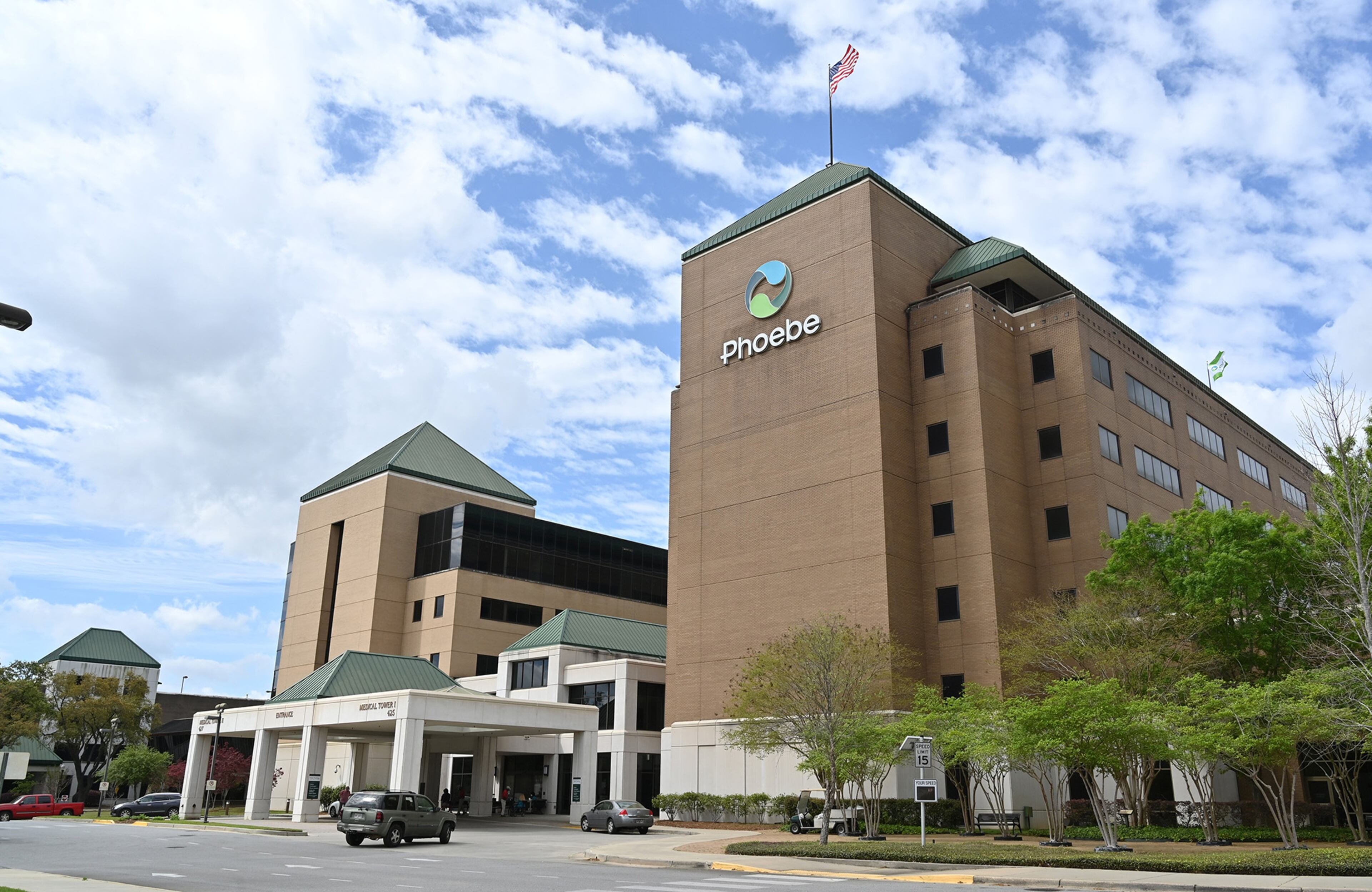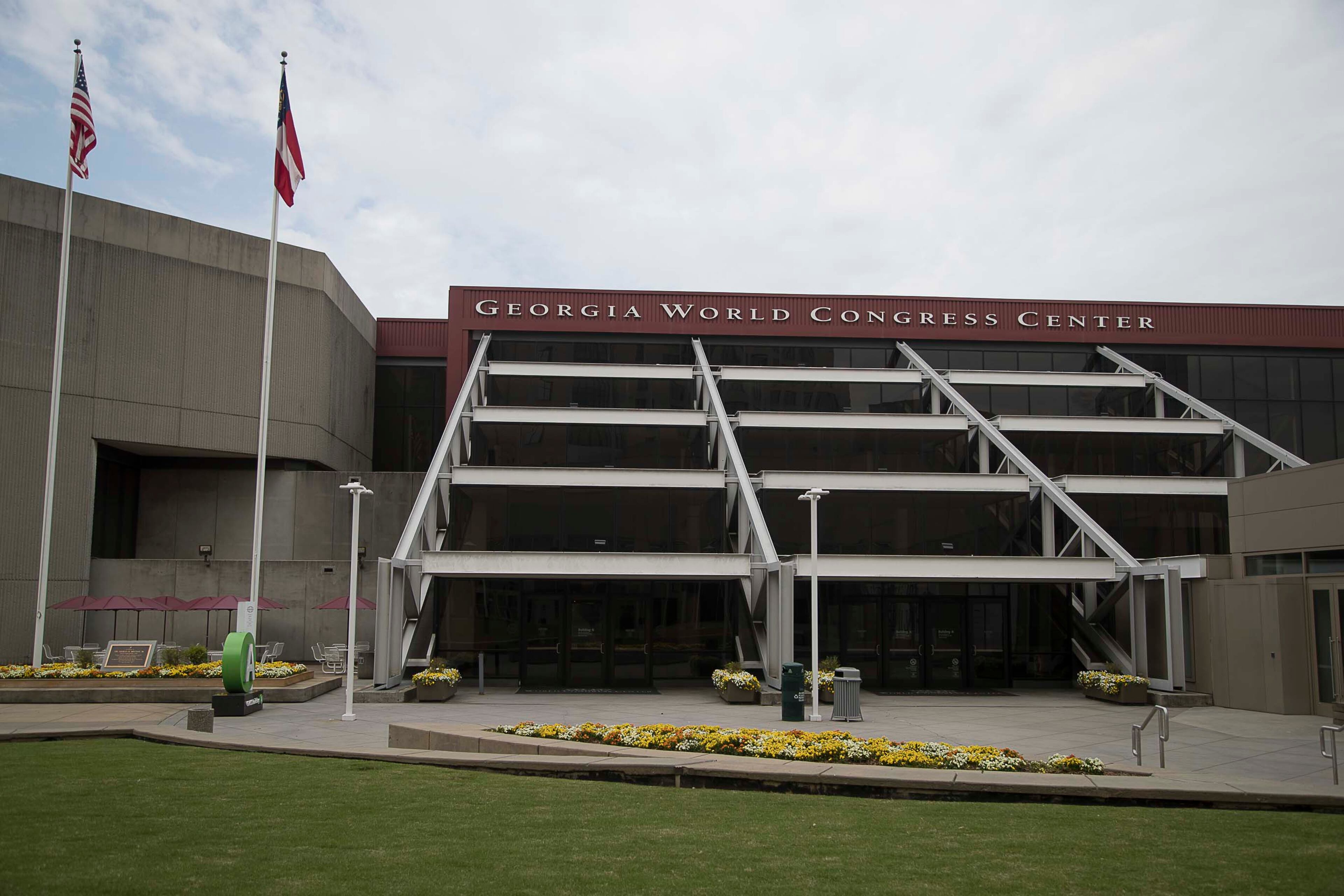As state braces for patient surge, Albany’s overflow beds still empty
More than three weeks after asking the governor's office for help, Albany's beleaguered hospital system still doesn't have the overflow units it needs to keep up with its burgeoning roster of sick and dying patients.
The delays in opening new hospital space in a partially-empty building a mile and half away from Phoebe Putney Memorial point to the challenges Georgia faces in preparing for a patient surge when COVID-19 infections are expected to peak statewide late this month.
The coronavirus epidemic will claim large numbers of new seriously ill patients through the next weeks in Georgia — perhaps 3,000 coronavirus patients could be hospitalized on the peak day alone. Pop-up units ranging from convention centers to tents and vacant hospital floors are being readied to handle the surge, and Gov. Brian Kemp's administration has contracted to hire hundreds of doctors, nurses and other health care workers to treat the patients. But as Georgia looks to staff up, it is competing with hospitals in hard-hit areas around the country that have been devouring key staff for weeks.
While the company that Georgia chose to supply the workers in Albany says it is meeting the terms in the state contract, a top hospital official in Albany pinned the delays there on staffing shortages. So far, the additional staff has been largely been absorbed at the main hospital. Not enough doctors and nurses have come yet to open the overflow facility.
“The real estate’s the easy part,” Phoebe Putney CEO Scott Steiner told The Atlanta Journal-Constitution this week. “The hard thing is finding 40 critical care nurses. They’re a scarce resource.”
The hospital system starting planning for a surge facility in early spring, when it was overrun with COVID-19 cases and begging other hospitals to take its transfers. Staffers were exhausted, and more than a dozen had become infected themselves with protective equipment dangerously low.
April wouldn’t be soon enough to open the space in Phoebe North, Steiner had said.
Later, though, the governor’s office said the facility wouldn’t be ready until the week of April 6, citing problems with construction and staffing. Now, the date for taking the first COVID-19 patients at the surge facility has been pushed April 22 — more than a month after Albany’s nightmare began.
» COMPLETE COVERAGE: Public given sparse details on deadly outbreak
» MORE: Coronavirus stimulus checks: 5 myths debunked

Caseload triples
As Phoebe Putney strained under the patient load, the governor’s office in late March sent supplies and National Guard members to help out.
The state chose Atlanta-based Jackson Healthcare to supply about 230 workers for Phoebe North in Albany, as well as another 145 temporary staffers at Phoebe's main hospital and another 195 for the other surge facilities, according to a news release from the governor's office.
The first group of seven temp workers from Jackson arrived at Phoebe Putney on March 30, according to the hospital. Another 13 came on April 6, and 47 came on Monday to go through orientation. Another 90 are expected to arrive on April 20.
Company President Shane Jackson said he understood that Phoebe would have liked to have liked to staff up “instantly.”
“It does take time,” he said.
“There was a schedule for how that was going to be staffed and in what order those projects were going to be brought up and in what order the staff was going to come in for each of them. We have been right on with that schedule,” Jackson said.
He also said the company already has a robust amount of workers on its roster.
“The challenge has been specifically around a really high demand of people who can work with critical care patients,” Jackson said. “Intensivists, critical care nurses, respiratory therapists, those kinds of individuals. In particular, getting those people into some of the hot spots.”
A spokesman for Kemp said supply problems as well as staffing problems led to the delay at Phoebe North.
“Phoebe North required extensive investment in equipment, pharmaceuticals, and staffing — that were more difficult to obtain than originally thought — and our first priority was to ensure Phoebe Main and their existing facilities had the necessary resources to continue serving patients,” Cody Hall said in a written statement.
With its surge facility not available, over the past month the Albany hospital has had to cope with capacity problems by expanding internally, going from three intensive care units to five, and creating five coronavirus floors throughout the building. The number of hospitalized COVID-19 patients has more than tripled in that time, with 138 reported at the main hospital on Wednesday. The death count there is at 55, plus another 12 at a sister hospital in Americus.
And while Albany has been waiting for Phoebe North to open, national healthcare staffing agencies have been beckoning nurses to the front lines of New York and New Jersey, promising pay rates ranging up to $10,000 per week — far more than what most Georgia nurses earn in a month.
Steiner said a handful of Phoebe’s contract nurses, hired through other staffing agencies, recently broke their contracts so they could trek to New York and earn more money.
“We’re competing with everybody else,” the CEO said. “I’m competing for Cepheid quick test kits. And we’re competing for nurses.”

World Congress Center plan
Jackson said he is confident the company can source the rest of the workers that are to be placed around the state. More than 90 percent of the 570 needed staffers have already been identified, he said.
The company is also supplying staff for temporary medical units placed at Floyd Medical Center in Rome, Northeast Georgia Medical Center in Gainesville, Navicent Health in Macon, as well as for two nursing homes and Central State Hospital in Milledgeville.
Another company, Virginia-based PAE, is responsible for supplying both the equipment and staffing for the temporary, 200-bed hospital that will be set up at the World Congress Center complex for patients experiencing mild to moderate symptoms of COVID-19.
Hall said that by having one company responsible for all staffing and equipment, the state can avoid the delays that beset Phoebe Putney in working with multiple suppliers.
“The availability of equipment, PPE and staffing has improved in the last couple of weeks given other hot spots in the country have passed their peak,” the spokesman said in an email.
No announcement has been made on how staffing will be handled for the similar makeshift facilities planned at the Savannah Convention Center and an unspecified location in Macon.
State Rep. Viola Davis, herself a critical care nurse, said it may be tough for Georgia to find all the types of nurses that will be needed. The state has a long history of underpaying nurses, especially experienced intensive care unit nurses, compared to rates in California and New York. She said she would be surprised if the state can get close to 600 healthcare workers up and running in time for the anticipated surge, amid an ongoing bidding war.
“Most of the agency nurses that I have spoken to are going to the locations that are paying $5,000 to $8,000 a week,” Davis, D-Stone Mountain, said. “We have to also remember, nurses are critical in any hospital, and right now the price of their experience is top dollar.”
Jackson declined to release details of his company’s contract with the state, such as breakdowns of the types of workers at different locations or deadlines. He said the contract would be available through the Department of Community Health.
The Atlanta Journal-Constitution asked DCH for a copy of the contract, but the agency said it would treat the inquiry as an open records request, which can result in delays of days or weeks.


